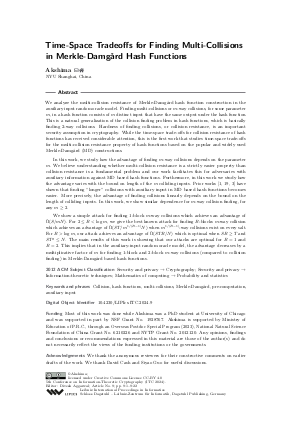LIPIcs.ITC.2024.9.pdf
- Filesize: 0.74 MB
- 22 pages

 Creative Commons Attribution 4.0 International license
Creative Commons Attribution 4.0 International license

We analyze the multi-collision resistance of Merkle-Damgård hash function construction in the auxiliary input random oracle model. Finding multi-collisions or m-way collisions, for some parameter m, in a hash function consists of m distinct input that have the same output under the hash function. This is a natural generalization of the collision finding problem in hash functions, which is basically finding 2-way collisions. Hardness of finding collisions, or collision resistance, is an important security assumption in cryptography. While the time-space trade-offs for collision resistance of hash functions has received considerable attention, this is the first work that studies time-space trade-offs for the multi-collision resistance property of hash functions based on the popular and widely used Merkle-Damgård (MD) constructions.
In this work, we study how the advantage of finding m-way collisions depends on the parameter m. We believe understanding whether multi-collision resistance is a strictly easier property than collision resistance is a fundamental problem and our work facilitates this for adversaries with auxiliary information against MD based hash functions. Furthermore, in this work we study how the advantage varies with the bound on length of the m colliding inputs. Prior works [Akshima et al., 2020; Ashrujit Ghoshal and Ilan Komargodski, 2022; Akshima et al., 2022] have shown that finding "longer" collisions with auxiliary input in MD based hash functions becomes easier. More precisely, the advantage of finding collisions linearly depends on the bound on the length of colliding inputs. In this work, we show similar dependence for m-way collision finding, for any m ≥ 2.
We show a simple attack for finding 1-block m-way collisions which achieves an advantage of Ω̃(S/mN). For 2 ≤ B < log m, we give the best known attack for finding B-blocks m-way collision which achieves an advantage of Ω̃(ST/m^{1/(B-1)}N) when m^{1/(B-1)}-way collisions exist on every salt. For B > log m, our attack achieves an advantage of Ω̃(STB/N) which is optimal when SB ≥ T and ST² ≤ N. The main results of this work is showing that our attacks are optimal for B = 1 and B = 2. This implies that in the auxiliary-input random oracle model, the advantage decreases by a multiplicative factor of m for finding 1-block and 2-block m-way collisions (compared to collision finding) in Merkle-Damgård based hash functions.























Feedback for Dagstuhl Publishing